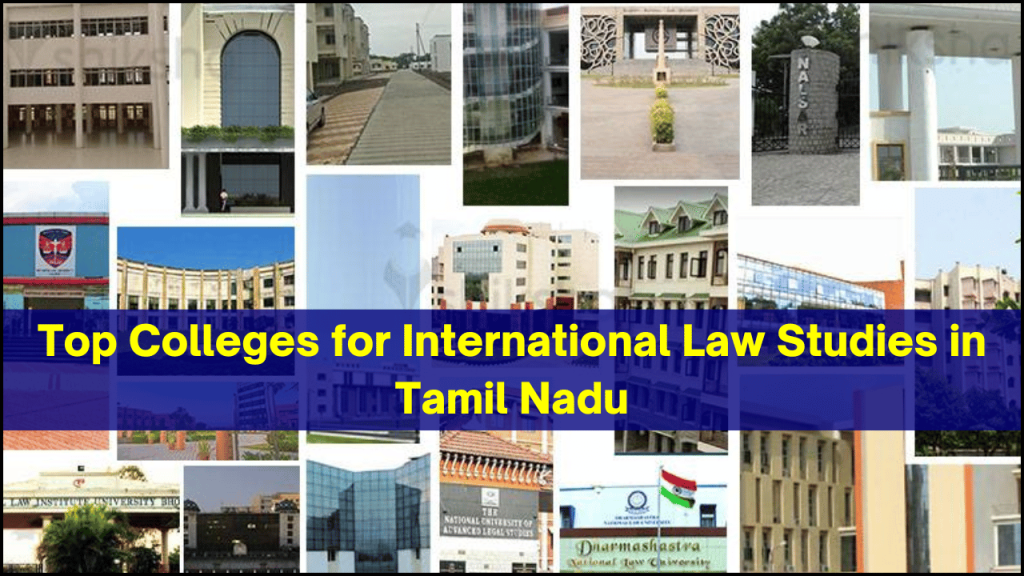
Tamil Nadu has emerged as a significant hub for legal education in India, with several prestigious institutions offering specialized programs in International Law. For aspiring legal professionals interested in global legal frameworks, diplomatic relations, and international governance, the state provides excellent academic options. This article explores the leading law colleges in Tamil Nadu that focus on International Law studies, their unique offerings, admission processes, and what sets them apart.
Government Universities Leading the Way
1. Tamil Nadu Dr. Ambedkar Law University (TNDALU)
Established as a state university dedicated to legal education, TNDALU has built a strong reputation for academic excellence in various legal disciplines, particularly International Law.
Key Highlights:
- Specialized LL.M. Program: The university offers a dedicated LL.M. program in International Law and Organization, covering critical aspects of global legal frameworks.
- Research Opportunities: Students benefit from research centers focused on international legal studies and human rights.
- Distinguished Faculty: The teaching staff includes experienced academics and practitioners with expertise in international legal affairs.
- Moot Court Activities: TNDALU regularly participates in prestigious international moot court competitions, providing practical exposure to international legal advocacy.
- Library Resources: The university maintains an extensive collection of international legal materials, treaties, and journals.
TNDALU’s central location in Chennai provides students with access to international organizations, consulates, and legal firms specializing in international matters, enhancing networking and internship opportunities.
2. Tamil Nadu National Law University (TNNLU)
TNNLU, located in Tiruchirappalli, is part of the elite group of National Law Universities in India. Since its establishment, it has focused on delivering comprehensive legal education with a strong emphasis on international legal studies.
Notable Features:
- Integrated Curriculum: The university offers a five-year integrated law program with specialized papers in International Law, International Human Rights, and Diplomatic Law.
- Exchange Programs: TNNLU maintains partnerships with universities abroad, facilitating student and faculty exchanges.
- International Conferences: The institution regularly hosts conferences on contemporary international legal issues, bringing global perspectives to students.
- Legal Aid Clinic: Students can participate in legal aid activities with international dimensions, addressing refugee and immigration matters.
- Advanced Research Facilities: The university provides modern research infrastructure for in-depth study of international legal systems.
Leading Private Institutions
1. VIT School of Law
Part of the prestigious Vellore Institute of Technology, the VIT School of Law has quickly established itself as a center of excellence for legal education, including International Law studies.
Distinctive Aspects:
- Interdisciplinary Approach: VIT integrates International Law studies with technology, business, and diplomacy courses.
- Industry Connections: The school maintains strong ties with international legal firms and organizations, enhancing placement opportunities.
- Practical Training: Students receive extensive practical training through simulations, internships, and clinical programs focused on international legal practice.
- Technology Integration: VIT leverages advanced educational technology for teaching international legal concepts and research methodologies.
- Global Perspective: The curriculum emphasizes comparative legal studies and global governance frameworks.
The university’s multicultural campus environment naturally complements international legal studies, with students from diverse backgrounds contributing varied perspectives to classroom discussions.
2. SRM School of Law
Affiliated with SRM Institute of Science and Technology, this law school has gained recognition for its modern approach to legal education, with strong offerings in International Law.
Key Strengths:
- Comprehensive International Law Curriculum: The school offers extensive coverage of public and private international law subjects.
- Distinguished Visiting Faculty: Regular lectures by international legal experts enrich the learning experience.
- Modern Infrastructure: State-of-the-art facilities support effective learning of complex international legal concepts.
- International Moot Courts: Students regularly participate in prestigious international moot court competitions.
- Internship Programs: The institution facilitates internships with international organizations and law firms.
SRM’s proximity to Chennai’s diplomatic and commercial centers provides students with valuable exposure to practical aspects of international legal practice.
Admission Process and Entrance Examinations
Gaining admission to these prestigious institutions typically requires clearing one of several competitive entrance examinations:
Common Law Admission Test (CLAT)
CLAT is the primary entrance examination for National Law Universities, including TNNLU. The test evaluates candidates on:
- English language comprehension
- General knowledge and current affairs
- Legal reasoning
- Logical reasoning
- Quantitative techniques
Common University Entrance Test (CUET)
Some universities accept CUET scores for their law programs. This standardized test assesses:
- Language proficiency
- Domain knowledge
- General test for reasoning ability
All India Law Entrance Test (AILET)
While primarily for National Law University Delhi, some Tamil Nadu institutions consider AILET scores for admissions. The examination covers:
- English and legal aptitude
- General knowledge
- Reasoning
- Elementary mathematics
VIT Engineering Entrance Examination (VEE)
For admission to VIT School of Law, candidates may need to appear for the university’s entrance examination, which assesses aptitude and legal reasoning skills.